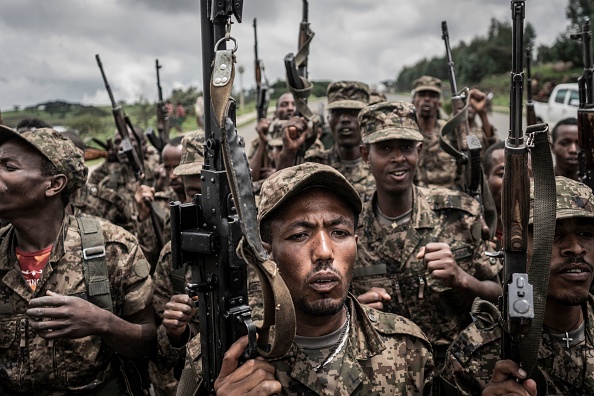Addis Ababa – Eritrea’s army is again backing Ethiopian troops in the war against Tigrayan rebels after fighting reignited in late August, raising fears about where the brutal conflict is headed.
Analysts say Eritrean President Isaias Afwerki’s authoritarian regime is playing a pivotal military role in the near two-year conflict and has little interest in seeing peace restored.
The renewed combat has hastened diplomatic efforts, with the African Union inviting the Ethiopian government and the Tigrayan regional authorities to sit down at the negotiating table.
Talks had been scheduled to start in South Africa last Saturday, but failed to take place, with diplomats suggesting logistical issues were partly to blame.
What’s the latest?
Eritrea’s army supported Ethiopian forces in the early stages of the war which began in November 2020 when Prime Minister Abiy Ahmed sent soldiers into Tigray to unseat the TPLF, accusing the group of attacking federal army camps.
One of the world’s most closed nations, Eritrea has been accused of heinous human rights atrocities during the conflict, including massacres and mass rapes.
Its troops returned to the battleground after intense fighting resumed in August, shattering a five-month truce, and Eritrea has called for a mobilisation of its armed forces, according to several Western nations.
Mike Hammer, the US Horn of Africa envoy who is in the region to push for peace, says Eritrea’s renewed military involvement was inflaming the situation.
ALSO READ | Eritrea ‘inflaming’ suffering in Ethiopia war, says US envoy
“Eritrea’s re-entry into Ethiopia has made matters significantly worse, it needs to withdraw and respect Ethiopia’s sovereignty – as should others who are fuelling the conflict,” Hammer told reporters at the weekend.
Tigrayan authorities have accused Eritrean forces of launching a “full-scale” offensive, with heavy combat reported on multiple fronts in recent weeks, including along the Tigray-Eritrea border.
TPLF spokesman Getachew Reda said last month that Eritrea had deployed “its entire army as well as reservists”.
It is not possible to verify battlefield claims as access to northern Ethiopia is severely restricted and Tigray has been under a communications blackout for more than a year.
Why did Eritrea intervene?
Analysts say Eritrea’s actions are driven by a longstanding rivalry with the TPLF, which dominated Ethiopia’s ruling coalition for 27 years before Abiy took power in 2018.
That same year, Abiy and Isaias struck a peace deal that ended two decades of war between the two neighbours and earned the Ethiopian leader the Nobel Peace Prize the following year.
The rapprochement was “above all an alliance with Eritrea to potentially intervene later against the Tigrayan leaders”, said Patrick Ferras, a geopolitical researcher and president of Strategies Africaines.
Abiy “played on the fierce hatred that Isaias Afwerki has for the TPLF, which he dreamt of confronting”.
But he said the TPLF does not represent an “existential threat” to Eritrea.
What’s the source of the rivalry?
Before becoming sworn enemies, the TPLF, then led by Meles Zenawi, and Isaias’s Eritrean People’s Liberation Front (EPLF), joined forces against Mengistu Hailemariam’s Derg in the 1970s and 1980s.
Despite the alliance, “Isaias Afwerki and Meles Zenawi have always been fiercely antagonistic”, Ferras said.
After the fall of Mengistu in 1991, Ethiopia and its TPLF masters granted independence to Eritrea which became a sovereign nation in 1993.
But war erupted again in 1998-2000, triggered by a territorial dispute over parts of Tigray, that Ferras said was “the continuation of the rivalry (between Meles and Isaias)”.
How important is Eritrea’s involvement?
Asmara’s cross-border incursion and the deployment of Ethiopian troops in Eritrea is enabling Abiy to take on the Tigray rebels on two fronts, with the federal government also relying on regional forces.
Ben Hunter, Africa analyst at risk intelligence group Verisk Maplecroft, described Eritrea’s role as “crucial”, but added that “by sending thousands of his soldiers to Eritrea, Abiy has placed his fate in the hands of Isaias Afwerki”.
Eritrea is one of the world’s most highly militarised countries and although the exact size of its armed forces is not known, military service is mandatory for both young men and women.
“The Eritrean military has been bolstered by President Isaias Afwerki’s decision to fully mobilise, and it is receiving fresh equipment from Ethiopia,” Hunter said, but added that thousands of young Eritreans flee the mandatory conscription every year.
He said there was “little evidence” that the Ethiopian-Eritrean alliance has the capability to defeat the TPLF on the battlefield.
“Even with Abiy and Afwerki’s upper hand in terms of material, the higher morale and home-turf advantage of the Tigrayan army will make it a formidable foe.”
Could Eritrea block peace efforts?
The African Union has not invited Asmara to the negotiating table and observers say it is difficult to predict what Isaias would do if the talks succeed.
“Even if Abiy did seriously decide to pursue an end to the conflict, Eritrea has no interest in peace and Afwerki now has the manpower to fight on without him,” Hunter said.
Ferras said it would be “very difficult (for Abiy) to get out of the tactical alliance”.
Isaias would likely demand that Abiy hand over chunks of land in Tigray “that the Border Demarcation Commission allocated to Eritrea in 2002” after the war, Ferras said.
Nevertheless, “I cannot see him leaving Tigray under the control of the Eritreans (which) would be viewed very poorly by the Ethiopian population”.
Follow African Insider on Facebook, Twitter and Instagram
Source: AFP
Picture: Getty Images
For more African news, visit Africaninsider.com


